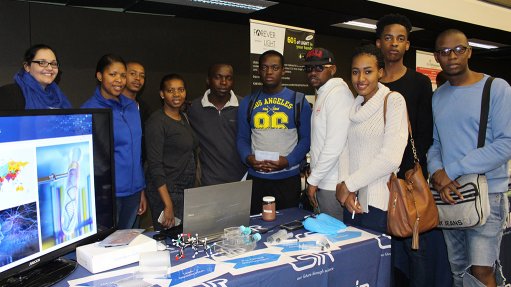
CSIR BIOSCIENCES CAREER DAY Dr Jenny-Lee Panayides, PhD student Valerie Ramaotsoa and TUT chemistry undergraduates at the CSIR career day
The Council for Scientific and Industrial Research’s (CSIR’s) career day, part of the Department of Science and Technology’s national science week, garnered significant interest from schoolchildren and undergraduate students, says CSIR human capital development manager Joseph Tshikomba.
Chemistry students from Tshwane University of Technology and pupils from various schools around Tshwane attended the event at the CSIR this month and learned about careers in scientific research and technical industries, including biosciences, nanotechnology, defence and aerospace, drug discovery, organic chemistry and materials sciences, among other disciplines.
The pupils and students asked CSIR scientists and interns technical questions. They were also given a tour of the Energy Lab, which develops photovoltaic, hydrogen and energy storage systems, with an emphasis on using South Africa’s mineral resources.
CSIR Biosciences senior researcher and student supervisor Dr Jenny-Lee Panayides highlighted that pupils and students were engaged and enthusiastic on the day. This mirrored the enthusiasm she noted among primary schoolchildren at the launch of the national science week, in Cape Town, earlier this month, where they asked where medicine came from.
“While the questions were informed by the children’s daily experiences, such as HIV and cancer medication and the use of traditional medicines, the interest the children displayed was noteworthy and encouraging.
“High school pupils [at the CSIR career day] asked about the study requirements and career paths of the scientists and postgraduate students, indicating that they were interested in science careers,” she said.
Women were well represented among the pupils, students, scientists and interns at the event; helping to illustrate the science career paths open to them.
Panayides’ organic chemistry PhD student Valerie Ramaotsoa highlighted that students and pupils asked many questions about natural compound extraction and use, including the impact of harvesting on ecosystems and how scientists mitigate any negative impact on natural environments.
Ramaotsoa explained to them that there are hundreds of compounds in any plant, and that it was typically best practice to isolate an active or promising compound and then re-synthesise it in the laboratory, rather than repeatedly extracting and separating it out from the other compounds in harvested plants.
Identifying promising molecules required molecular modelling, and the characterisation of the active pharmacophore of the molecule to determine whether a molecule would react in the way required, for example, whether the molecule would bind within the active site of a specific type of cancer cell, she added.
Tshikomba praised the interest and enthusiasm of the pupils and noted that there was a significant number of questions about opportunities for internship, bursaries and workplace experience from the students.
“The number of questions about further study, internship and career development highlights the need, and demand, for support of scientific careers among South Africa’s youth,” he concluded.